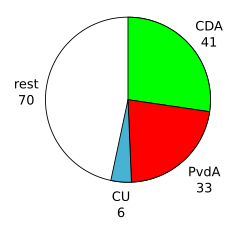Fourth Balkenende cabinet | |
|---|---|
Cabinet of the Netherlands | |
  The installation of the fourth Balkenende cabinet on 22 February 2007 | |
| Date formed | 22 February 2007 |
| Date dissolved | 14 October 2010 3 years, 234 days in office (Demissionary from 20 February 2010) |
| People and organisations | |
| Head of state | Queen Beatrix |
| Head of government | Jan Peter Balkenende |
| Deputy head of government | Wouter Bos André Rouvoet |
| No. of ministers | 16 |
| Ministers removed | 7 |
| Total no. of members | 19 |
| Member party | Christian Democratic Appeal (CDA) Labour Party (PvdA) Christian Union (CU) |
| Status in legislature | Centrist Majority government (Grand coalition) |
| History | |
| Election | 2006 election |
| Outgoing election | 2010 election |
| Legislature terms | 2006–2010 |
| Incoming formation | 2006–2007 formation |
| Outgoing formation | 2010 formation |
| Predecessor | Third Balkenende cabinet |
| Successor | First Rutte cabinet |
| Part of the Politics series |
![Azure, billetty Or a lion with a coronet Or armed and langued Gules holding in his dexter paw a sword Argent hilted Or and in the sinister paw seven arrows Argent pointed and bound together Or. [The seven arrows stand for the seven provinces of the Union of Utrecht.] The shield is crowned with the (Dutch) royal crown and supported by two lions Or armed and langued gules. They stand on a scroll Azure with the text (Or) "Je Maintiendrai" (French for "I will maintain".)](http://upload.wikimedia.org/wikipedia/commons/thumb/8/8f/State_coat_of_arms_of_the_Netherlands.svg/150px-State_coat_of_arms_of_the_Netherlands.svg.png) |
|---|
|
|
The fourth Balkenende cabinet was the executive branch of the Government of the Netherlands from 22 February 2007 until 14 October 2010. The cabinet was formed by the Christian-democratic Christian Democratic Appeal (CDA) and Christian Union (CU) and the social-democratic Labour Party (PvdA) after the election of 2006. The cabinet was a centrist grand coalition and had a slim majority in the House of Representatives with Christian Democratic Leader Jan Peter Balkenende serving as prime minister. Labour Leader Wouter Bos served as Deputy Prime Minister and Minister of Finance while Social Christian Leader André Rouvoet served as Deputy Prime Minister and Minister without Portfolio for Health, Welfare and Sport.
The cabinet served during the unstable late 2000s; domestically it had to deal with the financial crisis of 2008 and major reforms to the education system, while internationally, it had to deal with the war on terror and the government support for the Task Force Uruzgan. The cabinet suffered several major internal conflicts including multiple cabinet resignations. The cabinet fell prematurely on 20 February 2010 after the Labour Party refused to support an extension of the Task Force Uruzgan mission with the Labour Party cabinet members resigning on 23 February 2010, and the cabinet continued in a demissionary capacity until it was replaced after the election of 2010.